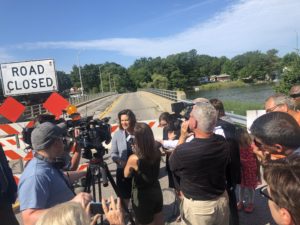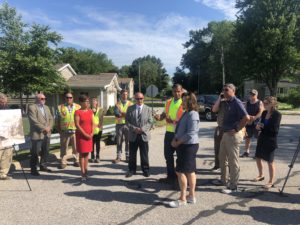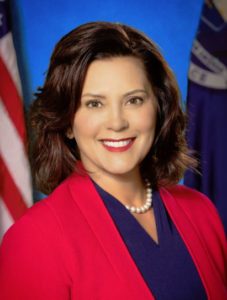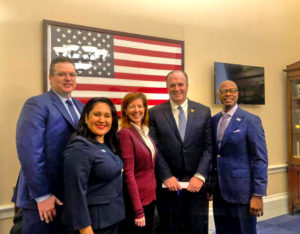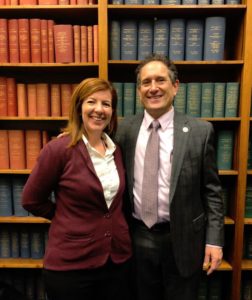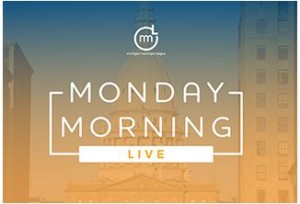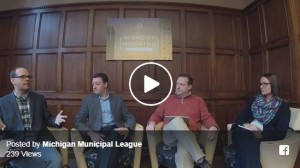With the voting this week, the Legislature officially wrapped up their activity for the year and reached the halfway point of the 2019-2020 legislative term. The House and Senate are now on recess until January 8th. All bills introduced in 2019 continue to remain eligible for action until the end of 2020.
Most of the Fall/year-end action these past two weeks has centered on arriving at a deal to resolve the budget cuts and transfers the Governor applied to the Legislature’s budget plan that was submitted just ahead of the October 1st beginning of the current fiscal year. Following the Governor’s $1.5 billion of cuts and shifts, the debate over finding a compromise heated up and resulted in a deal that was sent to the Governor early this week. Senate Bills 152 and 154 and House Bills 5176 and 5177 comprised the main pieces of this long-awaited agreement and encompass restoring about half of the GF/GP line item vetoes. In another action, the Legislature also approved a series of budget transfers totaling over $82 million. Of key interest for League members, the SB 152 supplemental restored the full $27 million for commercial forest, purchased lands, and swamp/reverted PILT payments to local units of government. Other impacts to certain local units of government were also restored, like secondary road patrol grants, county jail reimbursements, $15 million for PFAS and emerging contaminate clean-up, blight removal and urban search and rescue grants, $10 million for 2020 census related activities, and $13 million more in GF/GP for road repairs.
The two House Bills moved in conjunction with the budget bills establish a new requirement that the state budget be completed by July 1st every year and that any future State Administrative Board transfers not occur without prior notice to the Legislature.
The other item of focus during the last session days of 2019 related to creating new gaming authority for Michigan’s three commercial casinos and the state’s tribal gaming casinos. The new authority outlined in House Bills 4307 and 4916 (among other bills) paves the way for internet gaming and sport betting in Michigan.
In other legislative activity this Fall, the House moved HB 5124 with a nearly unanimous vote over to the Senate for future consideration. This legislation provides an additional, optional tool for local units of government to coordinate with their county to assist residents already afforded a poverty exemption from losing their homes to tax foreclosure.
A six bill legislative package intended to provide more protections for local units of government and stricter requirements for asbestos abatement contractors was recently reintroduced and reported from the House Natural Resources committee. The League has specifically engaged with House Bills 5046, 5047 and 5050. These bills will require asbestos abatement contractors to provide an affidavit to the local unit of government detailing any outstanding environmental violations or criminal offenses prior to entering the contract, require the community contact the Department of Energy, Great Lakes and Environment to investigate any outstanding consent orders, judgement or criminal offenses, and allow local governments to include a provision in a contract that would allow the municipality to withhold any payment to a contractor found by EGLE to have violated environmental regulations within the last 12 months. The full package is anticipated to appear in House Ways and Means Committee in January.
This first year of the 2019-2020 term wrapped up with the League working against a number of local zoning preemption bills. HB 4046 dealing with the zoning of short-term rentals had one hearing where local units of government from across the state expressed their opposition. As a result that bill sits in the House Local Government committee without the support needed to advance it. SB 431 looks to further restrict municipalities in regulating aggregate (gravel) mining operations. We anticipate this bill getting a hearing in Senate Transportation committee, and a bill to be dropped on the House side, early next year.
On the economic development front, SB 54 seeks to restore the state historic tax credit and had its first hearing earlier this week. We are working to secure another hearing early in 2020, continuing discussions and encouraging legislators to restore this needed tool. SBs 493 and 494 seek to extend the sunset dates of the Commercial Rehabilitation Act and the Commercial Redevelopment Act. Both bills have cleared the Senate and we anticipate the House taking them up early next year. The Good Jobs for Michigan legislation from last term is also seeking a sunset extension through SB 492. This bill is on the Senate floor awaiting a vote.
Since the Governor first took office there has been a constant drumbeat on increasing funding for transportation. Unfortunately the conversation never really materialized in 2019. There is hope that 2020 could still bring new revenue but the consensus is that it won’t be in the form of a .45 cent gas tax increase. The League will continue its engagement with the administration and legislative leaders to pursue a plan that invests in local roads and transit.
Both the House and Senate introduced a package of bills this Fall that would reform a number of transportation issues. Everything from allowing locals to raise their own gas tax (HB 4963) and vehicle registration fees (HB 4964), to requiring approval and identification of funding sources when expanding a local road (SB 521) were debated. Many of the bills are still being worked on, but HB 4966 which would allow cities and villages more flexibility when it comes to spending their Act 51 revenue did passed out of House Transportation Committee. We are hopeful that the new year will begin with a renewed attention on local transportation funding options and we will continue to work with Chairman O’Malley and Representative Sneller on these bills.
Finally, EGLE has announced three public comment dates in mid- January for the PFAS Draft Rules for Supplying Drinking Water to the Public. Grand Rapids (Jan 8) , Ann Arbor (Jan 14), and Gaylord (Jan 16) are the three communities selected to host these public comment hearings based on their unique experiences with PFAS contamination. The PFAS draft rules were recently released from the Environmental Rules Review Committee on Nov. 14th. The ERRC decided after deliberation over two meetings to allow the rules to move on to the public comment phase, but they retained their authority to bring the draft rules back to the ERRC following the public comment period and before review from the Legislature’s Joint Committee on Administrative Rules (JCAR). The League provided testimony on the stakeholder feedback process and initial review of the draft rules at the Oct. 31 ERRC meeting. See our blog with the details on the public hearings here.
Chris Hackbarth is the League’s director of state & federal affairs. He can be reached at 517-908-0304 and chackbarth@mml.org.

